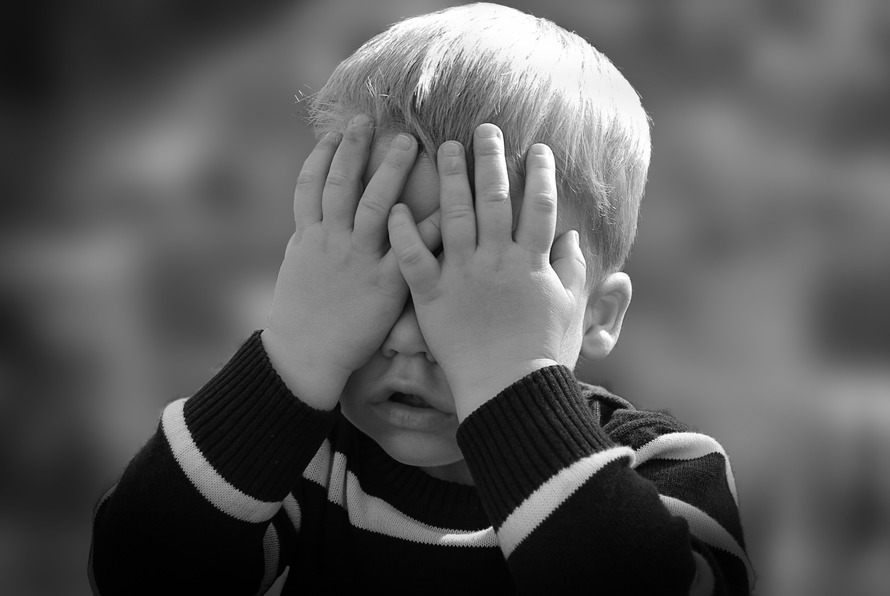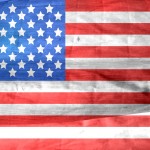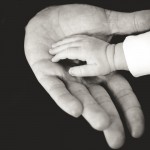*Trigger warning: childhood sexual abuse

My first memory is phallic. He was so big. Or else I was just so little. My mouth was level with the waistband of his navy athletic shorts as we both stood flat-footed in the side yard that hazy summer evening.
It must have made things quite convenient for him. I was three years old. He was seventeen. I don’t remember the gnats, but I know they were out that night because of my total disdain for them now. What I do remember is what the head of a dick felt like against the roof of my mouth. I remember the scent of teenage boy’s groin sweat mixed with the aroma of the pink crepe myrtles behind me. We must have been just out of sight of any adults. I remember the incoherent chatter of my mom with the church ladies in the kitchen, the sounds of hammering and a table saw as my dad and the neighbors built a deck that evening. They trusted the neighbor’s son to play with me. I wonder how many other little boys had played with that neighbor’s son.
I’ve never been able to call it rape. Rape is what angry men do to college girls when they throw them on the concrete and rip off their clothes. Rape is bleeding women talking to police officers in an ER. Rape is brutal.
Only, my memories are brutal, too. Still, I’ve never identified with the word. I was molested, I wasn’t raped. That’s different, right? He forced me to suck his dick against my will. Then he found some sick thrill in sucking mine. But that’s just being molested, right? Then again, I was tiny and he was practically an adult and my parents trusted him, so was it actually against my will? I couldn’t even spell “will” back then. I didn’t yet know I had one. Okay, so he left red marks on my thighs when he held me down. But I was three. You can’t rape a boy who is barely potty trained. Right?
My mom didn’t know anything until bath time. She turned on the water, I stripped down to climb into the tub, she saw the marks, and she screamed. My mom called my dad into the room, and they asked me what happened. It’s the only time I’ve ever told the story without shame. I told them, clearly and honestly, what the boy had done, and how big his tee-tee was. Years later, I learned that when the boy rode up on his bike the next day for his afternoon tutoring session with my mom, she told him to go away and never come back. She said if he ever came around again, she would tell his parents and call the police. His parents were having marital problems, and his father was an alcoholic, so my mom didn’t want to rock the boat. How thoughtful of her.
After that night, no one spoke of it again for fifteen years.
When your very first conscious memory is of not-rape, what happens next? For me, a lower middle class boy in a tiny town in the Bible Belt, I learned to perform. I could not verbalize my desperate need to escape the deep-seated shame back then, but I felt it. And early in life I found I could hide anything in the spotlight. When the curtains opened to the little boy from the turn of the century beside his grandma, whose white hair was really just a sprinkling of self-rising flour, I was the boy who had never been raped. People loved me for it. Performing was my first means of escape.
When I was five, I sang my first solo in the Christmas musical at the Baptist church, while my mom directed me from the audience. In first grade, I was interviewed by the local paper for Mother’s Day. That same year, I received a wooden plaque with a brass plate that read, “Good Citizen of the Year,” and in third grade, we moved away. Out of the little white house with yellow shutters and the big deck my Dad had built with the neighbors. Away from the pink crepe myrtle in the side yard. I cried the day my dad picked me up in the moving van because that little town was all I had ever known. But in my eight-year-old logic, I hoped things would be different now. Better, more free.
We moved to a new town, but we were still the same family. In the buckle of the Bible belt, life revolves around church. We were Pentecostal. My mom quoted Scripture nearly as much as she spoke in tongues. She loved to call the 700 Club to chat with a prayer partner, hoping to receive a “word of faith”. We raised our hands in Sunday worship, while my dad sang the solo.
A few years later, the spool began to unravel. Sixth grade was the year I started wearing hoodies every day, even in July. It was also the year I grew to hate PE. I’d never cared for sports. I’d always hated being around sweaty boys and I never understood the rules. I preferred singing and dancing in the show choir instead. Now I had to play sports with other boys, then go to a locker room every day and change clothes while surrounded by grimey, half naked adolescents. It was overwhelming every single day.
I was terrified of boys my age all the way through my teenage years, though I didn’t understand why at the time. They sensed my fear, and they preyed on it. They called me queer and fag and every other name twelve-year-old boys can think of. Their words cut deep. They were vocalizing my biggest fear. I was scared to death of being gay.
But I wasn’t gay. I was “going out” with a girl, which meant we played the original Nintendo in the basement at my house and we sat around at her house and kissed. She sat in my lap and I touched her chest, which wasn’t much bigger than mine. When she pulled down my pants, it was the first time anyone had done so with my permission. I don’t know where her parents were that day, or in the days that followed.
Meanwhile, I excelled in church and school. Performing served me well. Mission trips, choir tours, youth group, show choir, first chair in the band. I found my identity in my performance. I was growing into exactly the person my parents wanted me to be, masking my fear and total sexual confusion with religion and achievement.
Then came the moment that forever changed me. In seventh grade, I made the great porn discovery, which felt like I had found the cure to cancer. That year, I also traveled overseas for my first mission trip. My abilities as a star student and youth leader grew alongside my increasing fascination with pornography. I watched it nearly every day. My buddy even snuck a page from a Playboy inside the church bulletin and handed it to me one Sunday morning. He told me to wait until I was in the bathroom stall to look at it. I skipped Sunday school that morning. “Stomach bug,” I told them.
Like Jack’s beanstalk, my desire for both God and sex grew in equal strength and measure. Pornography was, by now, another means of escape for me. It was far more than adolescent curiosity. Before I was old enough to drive, my fascination had moved from curiosity, to habit, to addiction.
Yet my love for God was just as genuine. I should have had callouses on my knees from the countless times I knelt at the front of my church during altar calls, sobbing for God to forgive me, to re-save me and change me. I was covered in shame. I hated my parallel lives. I wanted to do the right thing. I wanted to be pure. Like any addict with half a conscience, I knew what I was doing was wrong, and I wanted to stop, but I couldn’t say no.
I learned in church that sin is constantly waiting outside our door, ready to pounce. At some point, the preacher said, our conscience is seared and we no longer care any more. I lived in constant fear that one day I would reach that tipping point, and there would be nothing Jesus could do for me. I worried every night that if I died, I would burn in Hell for eternity because of my secrets. But even the fear of a fiery Hell could not keep my teenage self, with a gross lack of self control, from filling my mind with images no one in the Bible belt was talking about.
In high school, I even confessed my addiction to the youth pastor. He laid hands on me, praying and believing in faith for the blood of Jesus to heal me. After saying “amen,” we didn’t talk about it again. He offered no insight, no resources, no practical steps to stop. If I believed in Jesus enough, my issues were all supposed to go away. That was the last time I talked to anyone at church about addiction.
During my senior year, in the middle of a class trip, the memory of the abuse came rushing back. We were touring the Department of Human Resources. When a presenter held up a little doll and described how it was used to identify where a child had been violated, I broke out in a cold sweat. A knot formed in the back of my throat, her words blurred in my ears, and my chest grew tight. I couldn’t breathe. All of a sudden I was three years old in the side yard of my old house again. It was my first panic attack.
I came home and asked my mom what she remembered from that day. She grew uncharacteristically quiet, and slowly sat at the kitchen table. She wouldn’t look me in the eye. She told me how the same neighbor boy who had not-raped me stole her underwear from the clothesline, first by sneaking into the backyard, then by breaking into the laundry room. The police found garbage bags full of evidence in his room. The judge sentenced him to community service and ordered him to write a letter of apology. So he had been prosecuted. Not for assaulting me, but for stealing my mother’s undergarments.
By the time I was nineteen, the Catholic Church’s sex scandal broke. Watching the trials was surreal. Just like all those little Catholic boys, my secret had been brushed right under the altar. I couldn’t believe what I was hearing on TV was true, yet I’d witnessed what people were capable of doing firsthand. I wanted to scream, “Me too!” but I didn’t know that was allowed. I wanted to hug them, to befriend them, to tell them I knew how they felt. But nobody I knew talked about issues like that. I had never met another man who had been molested. I later learned we can either spend a lifetime hiding our secrets or supporting each other, but we can’t do both. I was still hiding.
I don’t know what it is like for a woman to talk about rape, but I know that when I shared my story with guys, they didn’t understand why it was such a big deal. In a culture that is increasingly more open-minded and willing to talk about sexuality, several of the guys I knew during that time believed “a mouth is a mouth.” It was the beginning of the “bro-job” era, which is even more common now. A bro-job lets a guy get off without being gay. “It’s just a favor. A helping out. You take care of me, I take care of you. We’re not gay, we just both have needs, and this way, no bitch gets pregnant. We aren’t going to tell. We’re bros, right?” That was the conversation I heard from other guys. At the time, I was numb to their callousness. But now I think, thank God they could be that ignorant. Thank God they had absolutely no idea what they were saying, no frame of reference for the difference between consensual experimentation and rape. I wouldn’t wish that knowledge on anyone.
For years, my life was marked by fear. Fear of turning into my abuser. Fear of realizing I was gay. Fear of my wife discovering just how screwed up I actually am, and deciding I was not enough. Not man enough. Not strong enough. Not healed enough. Not sane enough. I was scared that I would be miserably unfaithful to my wife, and maybe even grow up to perpetuate the same crime that was done to me.
I still struggle with what happened in that side yard when I was three. Sometimes, I wish I could take my abuser out for coffee, in hopes that he would say he was just a curious teenager, just experimenting. It was all a misunderstanding, and actually, I was not raped. Of course that won’t happen. By now, I know I was, and it has colored my reality. I can’t change that, but I can decide what to do with my pain. I’m still angry at how my abuse was handled by my family and how my addiction was ignored by church leaders, but I refuse to be bitter and hardened for the rest of my life. Instead, I use my pain to connect with others, to maybe – hopefully – bring them the same peace I’ve always craved, too.
A culture that diminishes sexual violence is indelibly linked to my experience. I still have days when I find myself thinking, “At least it was only once.” While I am thankful I was only raped one time, the truth is it’s never only once. I’ve been haunted by the memories of that moment my entire life. The effects of abuse ripple out to impact relationships, decisions, habits, and my sense of self every single day.
Yet in time, I did begin to heal. My wife and I went through a solid year of intense marriage and individual therapy. One day, our marriage counselor connected the dots between my abuse, my addiction, and later, my suicide attempt. That day changed my life. She helped us both see that it all pointed back to shame. And I got better. It felt like putting on glasses for the first time. All at once, I could see the leaves on the trees, instead of just shapes and colors. We read Brene’ Brown together and we learned to talk about difficult things.
I still can’t bring myself to use the urinal in a public restroom, opting to wait for a stall with a door and lock instead. Yet my life today is more honest, more vulnerable, and more hopeful than it once was. I still have anxiety related to the abuse. I’m still tempted to escape through pornography when I am frustrated or isolated. Since I hid the abuse for so long, my unintentional habit is still to hide. Shame makes my gut response one of not showing up. Of escape. But I practice forming the new habit of opening myself to safe people and intentionally loosening the grip of shame, a little at a time.
For many years, I was terrified for my wife to know the depth of my pain or the truth of my addiction, but honesty has brought us closer to one another. Having someone who believes in me has changed my life more than any mental health program or Sunday sermon. I thank God for Lindsey every day.
So what happens when rape is your first conscious memory? It changes who you are. But it’s only the beginning of my story.












